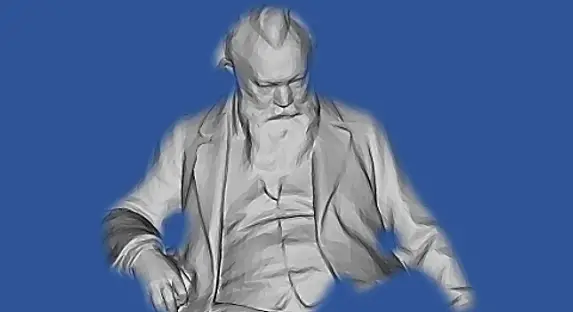WHO WAS JOHANNES BRAHMS?

COMPOSER JOHANNES BRAHMS
Born in Hamburg on May 7, 1833, Johannes Brahms was a German composer who passed away in Vienna, Austria-Hungary, on April 3, 1897. Being the son of a musician, he developed into a prodigy on the piano. During the year 1853, he had the opportunity to meet the composer Robert Schumann and his pianist wife, Clara, who pronounced him a genius right away. Clara became the focus of his emotions for the rest of his life.
Beginning in the year 1863, Johannes Brahms relocated to Vienna, which would serve as his primary residence until the time of his passing. During his career, he served in a variety of capacities, including conducting choral and orchestral ensembles and performing as a soloist. He gained a worldwide name as a result of the popularity of his German Requiem (1868), which garnered him even more recognition. His first symphony (1876) brought him even more fame, and his violin concerto (1879) and second piano concerto (1882) caused many people to declare him the greatest living composer.
As the Romantic individuality of the second half of the 19th century grew at a rapid pace, his music served to both complement and contradict this movement. In the sense that he had a deep respect for the intricacy and power of movement that the classical composers Haydn, Mozart, and Beethoven exhibited, he was of the traditionalist school of thought. Four of his symphonies were composed in the years 1876, 1877, 1883, and 1885. He also composed two piano concertos in the years 1858 and 1881, a violin concerto in the year 1878, and a double concerto for violin and cello from the year 1887.
In addition to sonatas for violin, cello, piano, and clarinet, his chamber music consists of four string quartets, two string sextets, two string quintets, three piano quartets, three piano trios, and three keyboard trios. He also composed choral music and more than 250 lieders during his lifetime.
The Formative Years of Johannes Brahms
Johannes Brahms, born on May 7, 1833, in Hamburg, Germany, is widely regarded as one of the most prominent composers of the 19th century and a key figure in the Romantic era of music. In the family of Johanna Henrika Christiane Nissen and Johann Jakob Brahms, he was the second of their three children. At a young age, he was exposed to music for the first time.
By the time Johannes Brahms was seven years old, the young man had already begun playing the piano. His father was a double bassist in the Hamburg Philharmonic Society. He was already an outstanding musician by the time he was a teenager, and he utilized his talent to earn money at local inns, in brothels, and along the city’s docks in order to alleviate the often difficult financial circumstances that his family was experiencing. Brahms was first introduced to Robert Schumann, a well-known German composer and music critic, in the year 1853.
The two men became close in a short amount of time, with Schumann recognizing in his younger comrade a tremendous deal of potential for the future of music. He referred to Brahms as a genius and publicly lauded the “young eagle” in an article that became renowned. The teenage composer became a well-known figure in the world of music almost immediately after receiving the positive words.
On the other hand, this music industry was likewise at a crossroads. Composers of the modernist movement, like as Franz Liszt and Richard Wagner, who were prominent figures of the “New German School,” criticized Schumann’s more traditional musical styles. They drew inspiration for their sound from the world of literature, which was characterized by organic structure and harmonic freedom.
This new sound was little more than a form of indulgence for Schumann, and it brought into question the brilliance of artists such as Johann Sebastian Bach and Ludwig van Beethoven. Schumann suffered from an illness in the year 1854. As an indication of the intimate affinity that Brahms shared with his mentor and his family, he offered his assistance to Clara Schumann, Schumann’s wife, in the management of her household affairs.
Music historians were of the opinion that Johannes Brahms fell in love with Clara quite quickly, despite the fact that she did not appear to have reciprocated his adoration for her. The two continued to be friends even after Schumann passed away in 1856. Over the course of the subsequent years, Brahms served in a variety of capacities, one of which was the position of conductor of a women’s choir in Hamburg, which he was assigned to in the year 1859. Two of the works that he produced were titled String Sextet in B-flat Major and Piano Concerto No. 1 in D Minor.
Brahms Professional Career
Life in Vienna
Johannes Brahms made his first trip to Vienna in the early 1860s. In 1863, he was appointed director of the Singakademie, a choral group, where he focused on historical and contemporary acappella compositions. Brahms, for the most part, was able to achieve consistent success in Vienna. At the beginning of the 1870s, he had already established himself as the principal conductor of the Society of Friends of Music.
Also, he served as the conductor of the Vienna Philharmonic Orchestra for a period of three seasons.
In 1868, after the passing of his mother, Johannes Brahms completed A German Requiem, a composition that was based on biblical themes and is frequently recognized as one of the most significant pieces of choral music that was composed in the 19th century. The work is comprised of multiple layers, including a mixed chorus, solo singers, and an entire orchestra. The contributions made by Brahms also covered lighter ground. Waltzes and two volumes of Hungarian Dances for piano duet were among the compositions that he wrote during this time period.
Later Years
In addition to being obstinate and unyielding, Brahms was notorious for being harsh and caustic when interacting with adults. When it came to children, he had a more compassionate side, frequently giving out penny candy to children he came across in his neighborhood in Vienna.
Moreover, he had a deep appreciation for the natural world and frequently went for extended strolls through the forest. Brahms resided in Vienna after his death. It was during the summers that he traveled extensively throughout Europe, and concert tours also required him to be on the road.
During these concerts, Brahms either conducted or performed something that was entirely composed by him. The 1880s and 1890s saw a steady increase in the quantity of compositions from which he might take inspiration. The Piano Trio No. 3 in C Minor, the Double Concerto in A Minor, and the Violin Sonata in D Minor were all pieces that he composed. In addition to it, he completed the String Quintet in F major as well as the String Quintet in G major.
During the final decade of his life, Johannes Brahms composed a number of pieces for chamber music. He collaborated with clarinetist Richard Muhlfeld on a series of songs, which included a Trio for Clarinet, Cello, and Piano, as well as a Quintet for Clarinet and Strings. The composer was able to have a nice life throughout these last years of his life. Since 1860, his music had been selling well, and Brahms, who was not spectacular or extravagant in any sense, led a plain, flat existence.
Johannes Brahms’ Personal Life
Never in his life did Johannes Brahms tie the knot. Following the failure of his attempt to make Clara Schumann his lover, Brahms went on to have a few relationships in the years that followed. They included an affair that he had with Agathe von Siebold in the year 1858, which he quickly ended for reasons that he never really understood. It would appear that Brahms had an easy time falling in love. According to one version of events, he was forced to deny teaching a woman how to play the piano because of his attraction to her.
Johannes Brahms was also a clever trader who was successful in the stock market. His wealth, on the other hand, was matched only by his charity, since Brahms frequently contributed money to his friends and to young students of music. It was clear that Brahms was a perfectionist because of his dedication to his profession. He frequently discarded completed works that he believed to be inferior, including over twenty string quartets.
Ending His Composing Career
In the year 1890, Johannes Brahms made the assertion that he was going to stop composing; nevertheless, this decision was only temporary, and he was soon back at it again. In the years leading up to his death, Brahms finished his Vier ernste Gesange, a piece of music that drew inspiration from the Hebrew Bible and the New Testament. It was a composition that revealed a lot about the composer, condemning everything that was discovered on earth and embracing death as a way to escape the excesses and agony of the material world.
The Demise of A Great Composer
Undoubtedly, Johannes Brahms himself was contemplating his own demise. After struggling with his health for a number of years, his longtime friend Clara passed away on May 20, 1896. It was during this period that Brahms’ own health started to decline. It was determined by the medical professionals that his liver was in a very terrible state. Vienna was the location of Brahms’ final performance, which took place in March 1897. A month later, on April 3, 1897, Johannes Brahms passed away as a result of difficulties brought on by cancer.
RELATED: BILLY JOEL AND STEVIE NICKS – Interesting Story About Billy Joel Stevie Nicks and the 2024 Concert
